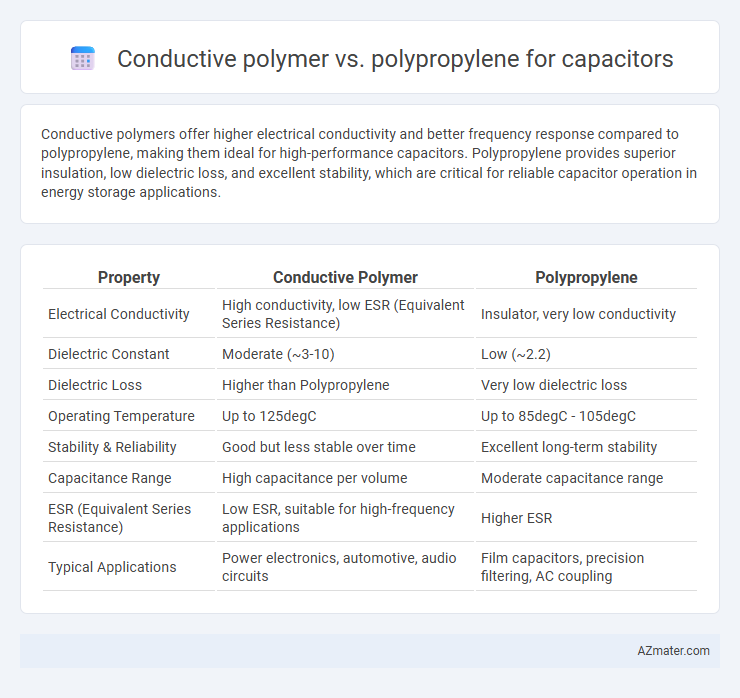Conductive polymers offer higher electrical conductivity and better frequency response compared to polypropylene, making them ideal for high-performance capacitors. Polypropylene provides superior insulation, low dielectric loss, and excellent stability, which are critical for reliable capacitor operation in energy storage applications.
Table of Comparison
| Property | Conductive Polymer | Polypropylene |
|---|---|---|
| Electrical Conductivity | High conductivity, low ESR (Equivalent Series Resistance) | Insulator, very low conductivity |
| Dielectric Constant | Moderate (~3-10) | Low (~2.2) |
| Dielectric Loss | Higher than Polypropylene | Very low dielectric loss |
| Operating Temperature | Up to 125degC | Up to 85degC - 105degC |
| Stability & Reliability | Good but less stable over time | Excellent long-term stability |
| Capacitance Range | High capacitance per volume | Moderate capacitance range |
| ESR (Equivalent Series Resistance) | Low ESR, suitable for high-frequency applications | Higher ESR |
| Typical Applications | Power electronics, automotive, audio circuits | Film capacitors, precision filtering, AC coupling |
Introduction to Capacitor Dielectric Materials
Capacitor dielectric materials play a crucial role in determining the performance characteristics such as capacitance, dielectric strength, and stability. Conductive polymers offer high dielectric constants and flexibility, enabling improved energy storage and faster response times compared to traditional polypropylene dielectrics. Polypropylene remains favored for its low dielectric loss, high insulation resistance, and excellent thermal stability, making it ideal for high-frequency, high-voltage capacitor applications.
Overview of Conductive Polymers in Capacitors
Conductive polymers in capacitors offer lower equivalent series resistance (ESR) and enhanced frequency response compared to traditional polypropylene films, making them ideal for high-performance and high-frequency applications. These polymers, such as polyaniline and polypyrrole, provide improved ionic conductivity and stability under varying temperature conditions, contributing to longer capacitor life and better reliability. Their ability to form thin, flexible layers allows for miniaturization and higher capacitance density, outperforming polypropylene in advanced electronic circuits.
Properties of Polypropylene in Capacitor Applications
Polypropylene exhibits a high dielectric strength of approximately 700 MV/m, making it ideal for capacitor applications requiring reliable insulation and high voltage endurance. Its low dielectric loss factor, typically around 0.0002 at 1 kHz, contributes to superior energy efficiency and minimal heat generation in capacitors. The polymer's excellent chemical stability and resistance to moisture absorption ensure long-term performance and durability in various environmental conditions.
Electrical Performance Comparison
Conductive polymers exhibit lower equivalent series resistance (ESR) and higher capacitance stability across wide temperature ranges compared to polypropylene, enhancing the overall electrical performance of capacitors. Polypropylene capacitors offer superior dielectric strength and low dielectric losses, making them ideal for applications requiring high insulation resistance and minimal leakage current. Conductive polymer capacitors excel in high-frequency applications due to faster charge and discharge cycles, whereas polypropylene capacitors prioritize long-term reliability and low dissipation factor in AC signal filtering.
Temperature Stability and Reliability
Conductive polymers in capacitors offer superior temperature stability with operational ranges typically between -55degC and 125degC, maintaining consistent capacitance and low equivalent series resistance (ESR) under thermal stress. Polypropylene capacitors exhibit excellent reliability due to their high insulation resistance and low dielectric loss, but their temperature limits usually range up to 85degC to 105degC, making them less suitable for high-temperature applications. The choice depends on application requirements, with conductive polymer capacitors preferred for high-temperature performance and polypropylene capacitors favored for low-loss and long-term reliability in moderate temperature environments.
Capacitance Tolerance and Efficiency
Conductive polymer capacitors exhibit superior capacitance tolerance, typically within +-5%, compared to polypropylene capacitors, which often have tighter tolerances around +-2% but can vary with temperature. Efficiency-wise, conductive polymer capacitors demonstrate lower equivalent series resistance (ESR), enhancing high-frequency performance and energy efficiency, while polypropylene capacitors excel in low loss and stability at high voltages, making them ideal for precision applications. The choice between conductive polymer and polypropylene capacitors hinges on balancing capacitance stability with operational efficiency based on specific circuit requirements.
ESR and ESL Characteristics
Conductive polymer capacitors exhibit significantly lower Equivalent Series Resistance (ESR) compared to polypropylene capacitors, enhancing high-frequency performance and reducing power losses. Polypropylene capacitors demonstrate superior Equivalent Series Inductance (ESL) characteristics due to their film construction, enabling better stability in high-voltage applications. The choice between conductive polymer and polypropylene capacitors depends on balancing the low ESR advantage for ripple current handling with the low ESL benefit for high-frequency resonance suppression.
Lifespan and Failure Modes
Conductive polymer capacitors exhibit longer lifespan and improved reliability compared to polypropylene capacitors due to their lower Equivalent Series Resistance (ESR) and enhanced self-healing properties. Polypropylene capacitors, while possessing excellent dielectric stability and low loss, are more susceptible to mechanical damage and dielectric breakdown under high voltage stress, limiting their longevity. Failure modes in conductive polymer capacitors often involve electrolyte drying and polymer degradation, whereas polypropylene capacitors primarily fail from dielectric rupture and electrode delamination.
Cost and Manufacturing Considerations
Conductive polymer capacitors generally have higher material costs compared to polypropylene capacitors due to the expense of conductive polymer materials and advanced manufacturing processes. Polypropylene capacitors benefit from established, cost-effective production techniques and raw materials, resulting in lower unit costs and high scalability for mass production. Manufacturing conductive polymer capacitors involves precise deposition and encapsulation steps, increasing complexity and production time, whereas polypropylene capacitors rely on simpler film winding and impregnation methods that support faster, more economical manufacturing.
Application Suitability: Conductive Polymer vs Polypropylene
Conductive polymer capacitors offer superior performance in high-frequency applications and environments requiring low Equivalent Series Resistance (ESR), making them ideal for power supply filtering and audio circuits. Polypropylene capacitors excel in high-voltage, high-precision applications such as RF tuning and audio signal processing due to their low dielectric loss and excellent thermal stability. The choice between conductive polymer and polypropylene capacitors depends on the specific application requirements for ESR, voltage rating, and frequency response in electronic circuits.

Infographic: Conductive polymer vs Polypropylene for Capacitor
 azmater.com
azmater.com